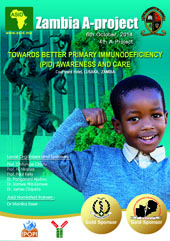Rasha Hasan, MD, PhD; lecturer of Pediatrics and Clinical Immunology, Faculty of Medicine, Ain Shams University, Cairo, Egypt.
The class II molecules of the major histocompatibilty complex (MHC) are involved in presenting antigens to CD4+ T cells. MHC class II molecules are expressed constitutively on antigen-presenting cells, including B lymphocytes, macrophages, and dendritic cells. MHC class II molecules expressed in the thymus also have a vital role in the intra-thymic maturation of CD4+ T cells. T cells as well can express MHC class II molecules when they are activated.
 MHC class II deficiency is an autosomal recessive disorder which is seen most often in patients from around the Mediterranean Sea. Patients presents early in infancy with a mild form of severe combined immunodeficiency (SCID) as they have increased susceptibility to pyogenic and opportunistic infections. They usually develop severe infections and protracted diarrhea in the first 6 months of life. Pseudomonas, CMV and Cryptosporidium infections are common. Four genetic disorders result in this syndrome but they are clinically indistinguishable. In most cases, there is no class II expression; however, in others the intensity of expression may be as high as 5% of normal. Patients with higher expression tend to have a milder course; these patients may survive beyond early childhood. Laboratory findings in most of the cases include: normal numbers of T cells and B cells, hypogammaglobulinemia (absent T cell help), normal mitogen responses but absent T-cell proliferation to antigens and reduced numbers of CD4+ T cells.
MHC class II deficiency is an autosomal recessive disorder which is seen most often in patients from around the Mediterranean Sea. Patients presents early in infancy with a mild form of severe combined immunodeficiency (SCID) as they have increased susceptibility to pyogenic and opportunistic infections. They usually develop severe infections and protracted diarrhea in the first 6 months of life. Pseudomonas, CMV and Cryptosporidium infections are common. Four genetic disorders result in this syndrome but they are clinically indistinguishable. In most cases, there is no class II expression; however, in others the intensity of expression may be as high as 5% of normal. Patients with higher expression tend to have a milder course; these patients may survive beyond early childhood. Laboratory findings in most of the cases include: normal numbers of T cells and B cells, hypogammaglobulinemia (absent T cell help), normal mitogen responses but absent T-cell proliferation to antigens and reduced numbers of CD4+ T cells.Patients with MHC class II deficiency differ from SCID patients in that they have T cells, which can respond to nonspecific T-cell mitogens such as PHA and to allogeneic stimuli. Also, unlike SCID patients, they do not sustain graft-versus-host disease when given HLA-mismatched blood transfusions. This is because the host tissue has no MHC class II molecules against which the T cells in the graft can react. Unlike in some other types of immunodeficiency, progressive infection with the attenuated live vaccine strain BCG has not been observed in MHC class II-deficient patients after BCG vaccination against tuberculosis (infected cells can be destroyed by cyotoxic T cells). Infections generally occur in the first year of life and involve the respiratory and gastrointestinal tracts. Respiratory insufficiency, failure to thrive, and organ dysfunctions ensue, frequently causing death in childhood. Hematopoietic stem cell transplantation (HSCT) is the only available curative treatment, despite the high risk of toxicity in this particular setting (success rates in MHC class II deficiency cases are lower than for SCID and the CD4+T lymphopenia persists). Incomplete clearance of parasites can lead to Cryptosporidium-associated sclerosing cholangitis (up to 16% of cases). Autoimmune cytopenias also occur in up to 19% of patients.
Further reading:



























